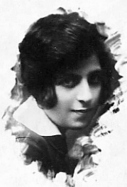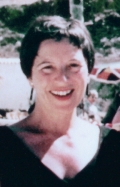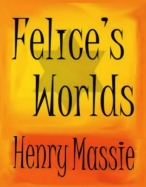|
Childhood in Szczuczyn (PDF Final Version, pg 91-92):
|
|
|
 |
 |
[L] Felice in Vilna, 1928
[R] Felice in the 1960s |
|
| |
|
As soon as Dr. Tomashevsky said she was well enough to go outside, they
couldn't keep her indoors. It was market day. Every Tuesday and Friday was a
market day, and she loved to run across the street to the Rynek, which teemed
with wagons, horses, animals, and farmers, and was so crowded she could hardly
make her way through. The farmers who leased land or worked it for the
landowners were known as the peasantry and they came from the countryside to the
market with their wives to sell their products--all kinds of food stuffs, fresh
vegetables, fruit, cheese, eggs, butter, and milk.
The landowners and farmers came from a radius of about 20 miles, about three
hours wagon or buggy travel to town over gravel and dirt roads, to negotiate the
selling of crops. Her father, Moses Ozerowicz, met with them, telling them how
much they could expect, then he would sell the crops to agents with whom he had
developed relationships in Bialystok, Koeningsburg, Riga, Warsaw, Frankfurt,
and Berlin, and keep a commission. Some crops the farmers brought to town in
wagons and stored in Moses' granary, while other farmers whose crops Moses
contracted for in advance would take them directly to the rail heads at Suwalki,
Lomza, and Grajewo.
Felice's mother bought all their fresh food on market day. At dinner she
would complain about how anti-Semitic the milk-woman was. Felice's father asker
her what made her think that, or how did she know? He never wanted to create
conflict; he always tried to see both sides of things. But her mother went on
about how this peasant or that peasant made crude comments about Jews and was
saying, "This Jew did that" or "That Jew did something else," calling us those
people. Felice was embarrassed that Manya or Katrina, who adored her, might
hear what her mother was saying. She was especially embarrassed that her
girlfriends might hear her mother talk that way.
Last Visit Home (PDF Final Version, pg 71-73):
|
|
|
|
 |
|
Henry Massie tells the extraordinary story of his mother Felice's life after escaping the Nazis. |
|
|
| |
|
 |
|
| |
|
 |
|
|
|
|
Felice's false marriage to Steinberg had allowed her entry into Palestine. A
few days after arriving, she had obtained British Mandate Passport #60260,
"Issued in Jerusalem to Mrs. Fega Steinberg born Ozerowicz, a naturalized
Palestinian citizen by marriage," on October 16, 1935. Six months later she
obtained a divorce from Steinberg, but the British Mandate passport was still
valid and gave her access to a visa to America. On June 2, 1937, the United
States consul in Jerusalem stamped immigration visa #690 into it. Eliyahu
Katz's gift of money gave her the means to make a last trip home to her family.
In Tel Aviv, her sister Hanka put her arms around her sister's neck and she
put her arms around Hanka. They cried and kissed each other. "Remember me when
it is good for you in America and you have success."
"I will," Felice replied.
In August 1937, she traveled by boat from Haifa to Istanbul and by train
through Bulgaria, and then by way of Belgrade, Budapest and Prague to Warsaw.
Purposeful and with only a transit visa, she made no stops along the way. From
Warsaw another train took her northeast for two hours to Bialystok and finally
a local line went to Grajewo. From there, the eight-mile stretch to Szczuczyn
was in a horse-drawn buggy. It was flat and rolling farming country, dotted
with small lakes and ponds and cut by streams, formed much like Minnesota in
America by the retreat of glaciers in an ancient era. The journey ran along
fields of wheat, oats, barley and rye beginning to be harvested; and plots of
potatoes and tobacco. There were a few cattle and huts with three or four hogs
outside. Every once in a while Felice saw pheasants, a swan, ducks, and geese.
Willows grew near water, and birch and pine forests began where the planting
ended. The buggy clattered onto cobblestones when it arrived in Szczuczyn and
took her to the Market Square in the heart of the town. Her home was on the
corner of Market Square and Church street, which sloped down two blocks from a
small rise. At the top of the rise stood the large Catholic church, cream and
pale blue plaster over a wooden frame. The fields began behind it. The houses
were plain and small, mostly one story but a few, like Felice's, had a second
story to provide extra bedrooms under the dormers. Since it wasn't a market
day, the village was quiet, the tranquility belying the disaster descending on
its inhabitants.
Her parents' letters hadn't prepared her for what she saw when she walked
through the door of her home. They hadn't wanted to frighten her. Her mother,
father, nineteen-year-old sister Miriam, and thirteen-year-old brother Berci
were crowded into one room. Once comfortably off, they had been forced to take
in boarders who like them had been dispossessed of their livelihood. Moses
Ozerowicz had once been mayor of the town and organized the charity fund for the
poor; now the communal relief workers stopped by with donations of little plates
of food for the Ozerowicz family.
Felice's small town was starving before her eyes. She knew things had
changed from the news she received in France and Palestine, but she had no idea
it was this bad. The Poles didn't use mechanization to make a systematic
extermination of the Jews. They didn't use social scientists and construct
buildings for the purpose like the Germans. The government just took people's
homes and businesses away from them and proceeded to make them penniless to
exterminate them with starvation.
"It was a catastrophe. It was not a foreboding of the future; they were
already a dying people. Part of me stared dying with them. When I took a walk
in the square, I saw the tubercular shoulders and ribs of the people. I thought
I would die of horror." She would never forget it. They were starving. She
would look into the Jewish shops and see a nail for sale here, a nail there, a
piece of food here, a piece of food there, and she would think, how do they sell
it? The Poles had put signs over the doors that said Entrance for Dogs. "How
do they live like that? How do they do it? The questions tormented me," she
later recounted.
From the twenty-odd dollars that remained of Eliyahu's gift and her last
paycheck she gave $10 to her family and kept $10 for the voyage to America. The
ticket that her uncle in New Haven had sent could be used on the MS Pilsudsky
departing in two weeks from Gdynia, Poland's new port on the Baltic. During
those last days at home she retraced familiar paths that formed the borders
between town and fields. She walked along the Bug River (pronounced Boog) and
walked to the granary that had been confiscated from her father under the
anti-Semitic racial laws. At the gain mill she watched the plodding horses walk
the grindstone around and around in a circle. She escaped the afternoon heat
under a tree in the square or in the room in the house that remained for her
family. As always she escaped into books--popular novels and philosophy. She
had never had more than a few close friends in the village because so much of
her life had been spent at boarding school, and all except one had left for
Warsaw, Palestine, Mexico, and New Zealand. Her remaining friend, Abraham
Nisonowicz, her former mathematics tutor was getting ready to leave for America
on the same boat as she.
Her father looked her straight in the eyes and said, "Did you ever imagine
such misery in our family?" She had no answer, but she shed a lot of tears…She
felt that she was being sent on a mission to save her family.
America, Felice's Dreams (PDF Final Version, pg 186-188):
Beauty did not save Felice nor did reading about psychoanalysis. Turning
outward to art, aesthetics, and her ravishing new American home could not save
her from her inner demons. Beauty could not hold the wolves at bay. It didn't
keep away the image of her family starving in Szczuczyn during her last visit or
the visions of her mother walking into a gas chamber and her brother swinging
from the beam of a bridge with a noose around his neck. Her physical beauty,
the adulations she was receiving, her embrace of aesthetics as an antidote to
life's ugliness could not save her from her inner terror. In the 1950s she
started having awful nightmares.
The timing probably had something to do with my brother and I growing more
independent from her. We didn't need her very much, and since she was not
needed she became more at loose ends, unable to stave off unhappiness. At
night, if I was sleeping lightly, I could hear her pacing. If I got up to go to
the bathroom in the wee hours of the morning, she might be reading in the study,
or my father might be sleeping in the study and my mother reading in the
bedroom. Sometimes I found her in the living room curled in one of the big
seashell-like chairs surrounded by darkness with one little light on over a
book. By the time the rest of us got up, Felice had found sleep and was nowhere
to be seen. On weekend mornings she might emerge toward noon.
She was too frightened to sleep at night because the Nazis might get her. My
father convinced her to consult with a psychiatrist, but his had an inherent
problem. "I knew them all, they were my friends," my mother told me. "What
good was that? They would say to me, 'Felice, you are my friend, how can I
treat you?' or, 'Felice, you are too smart for me, you will debate with me, and
we will never get to what is troubling you.' "
Alex Kaplan referred her to a psychoanalyst in Chicago. She flew there from
St. Louis on Monday mornings, had a visit with him the same day, spent the rest
of the afternoon at the Chicago Art Institute or walking along Michigan Avenue
and the lakefront, stayed the night at the gracious Drake Hotel, had another
therapy session on Tuesday morning, and flew home in time for dinner. At first
she said she liked her doctor and he was helping her, then her reports changed.
"He wears galoshes in this office when it is slushy outside, she complained.
"He doesn't take the rubbers off his shoes. It is not the way a man who
respects himself should behave. It says something about the inner man. He
should be concerned about his appearance."
Edward said, "But he has a fine reputation."
"The way he cares about himself says something about his mind."
A few weeks later over dinner, Felice announced, "I'm not going back to
Chicago anymore."
"Why not?" we asked.
"The man is out of his mind. Do you know what he said to me? 'Mrs. Massie, I
have been waiting all my life for a patient like you. You are incredibly
intelligent and beautiful. You are not like the boring businessmen from The
Loop and housewives from the suburbs. You bring something new and fresh and
beautiful into my office. May I call you Felice?' I think he is falling in
love with me."
|